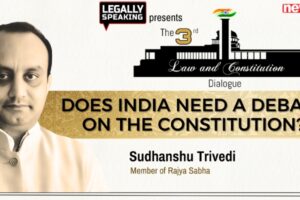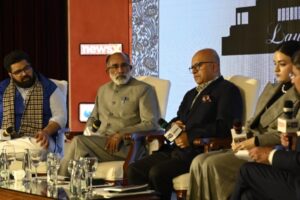
The dialogue on women’s reservation took center stage at a recent panel discussion, addressing a decades-long debate amplified by the recent passage of the Women’s Reservation Bill in Parliament. Despite this milestone, the bill’s implementation remains stalled, awaiting the next census and delimitation processes.
Moderated by Priya Sehgal, Editorial Director of NewsX, the panel featured diverse voices: Swati Maliwal, Rajya Sabha member; Jebi Mather, Congress MP; Subra, an author and political strategist; and representatives from other key political parties.
The Persistent Question: Why the Delay?
Swati Maliwal opened the discussion with a sharp critique stating, “We’ve been waiting since 1971. The real question is whether our society genuinely wants to see women at the forefront. Vocal, opinionated women remain unwelcome in political spaces dominated by patriarchy.”
Maliwal emphasized that resistance to women’s leadership transcends party lines. She suggested that entrenched societal norms hinder the political landscape from embracing strong female voices.
Congress’s Perspective: Taking Credit and Highlighting Shortfalls
Jebi Mather defended the Congress Party’s track record stating, “Congress has always championed women’s representation, from introducing 50% reservation in local bodies under Rajiv Gandhi’s leadership to ensuring women hold key positions at the grassroots level. However, we faced numerical challenges in passing the Women’s Reservation Bill during our tenure.”
Mather critiqued the current bill for its clauses linking implementation to future census data and delimitation, calling it a “non-starter” in its present form. She urged immediate action based on existing data.
Challenges Beyond Representation
Panelists delved into the broader struggles women face in politics.
Maliwal shared her journey:
“I’ve worked for 20 years at the grassroots level, handled over 170,000 cases with the Delhi Commission for Women, and became an MP. Yet, the challenges I faced reflect a larger issue—patriarchy within political parties. Implementation of women’s reservation must include protections against harassment and mechanisms for fair representation.”
Ikra, another panelist, emphasized the need for systemic changes to support women in leadership roles. Citing examples from Norway, she stated, “Societal changes are as important as political reforms. Norway’s 45% women representation in Parliament wasn’t achieved through quotas alone but by enabling women through state-supported childcare, parental leave, and equal opportunity policies.”
Cross-Party Consensus: A Distant Dream?
While the panel agreed on the necessity of women’s reservation, political differences persisted. Subra argued that even within progressive measures, the quality of leadership needs scrutiny, “We often focus on numbers, but what about the quality of leadership? Women leaders must support each other and create structures that nurture more women in politics.”
Ikra highlighted the challenges within her party, the Samajwadi Party, “My family’s political background gave me a head start, but it’s still a man’s world. Women must constantly prove themselves and remain vigilant. Societal attitudes, not just political reforms, need to evolve.”
Looking Forward: What Needs to Change?
The panel concluded on a hopeful yet critical note. Jebi Mather called for a unified push to expedite the implementation of the Women’s Reservation Bill without unnecessary delays.
Maliwal urged parties to lead by example, suggesting at least 50% of tickets in elections should go to women, “Research shows that women in decision-making roles bring greater focus on healthcare, education, and social issues. It’s time political parties recognize this.”
The Verdict
The discussion underscored that while the Women’s Reservation Bill is a step forward, systemic and societal barriers must be dismantled for meaningful change. Representation, protection, and societal reforms must go hand in hand to empower women in Indian politics.
Key points highlighted in the conversation include:
1. Gender Disparities in Political Representation: The speaker talks about the systemic limitations women face, such as time restrictions and the dominance of male leadership in politics. Women often have to adhere to these structures while also meeting additional societal expectations regarding their appearance, conduct, and language.
2. Stereotypes and Bias: There is a criticism of how women politicians are often scrutinized more intensely than their male counterparts, particularly regarding their appearance and behavior. For instance, one speaker notes how a female politician was judged for wearing Western formal clothes to parliament, while the same scrutiny is rarely applied to male politicians.
3. Underrepresentation of Women’s Issues: Women’s issues are often stereotyped, with topics like reservation and rape being the only areas discussed. The speaker argues that there should be broader conversations on issues like women in farming, which often go unaddressed.
4. Leadership and Recognition: The discussion touches on the legacy of Indira Gandhi as a female political leader in India. Despite her significant role, there are questions about whether her leadership is truly appreciated, or if it is overshadowed by male-centric narratives. Additionally, the idea of political dynasties, particularly the Gandhi family, is raised, questioning whether women leaders are judged more for their family connections than their abilities.
5. Cultural and Societal Challenges: There’s a recognition that societal views on women’s appearances and roles are deeply ingrained, with some male politicians unknowingly patronizing female leaders. The challenge lies in addressing these biases and ensuring that women are judged for their abilities and political merit, not just their looks or gender.
Read More: Understanding The Threat of Digital Arrests: Insights From the Third Law and Constitution Dialogue





